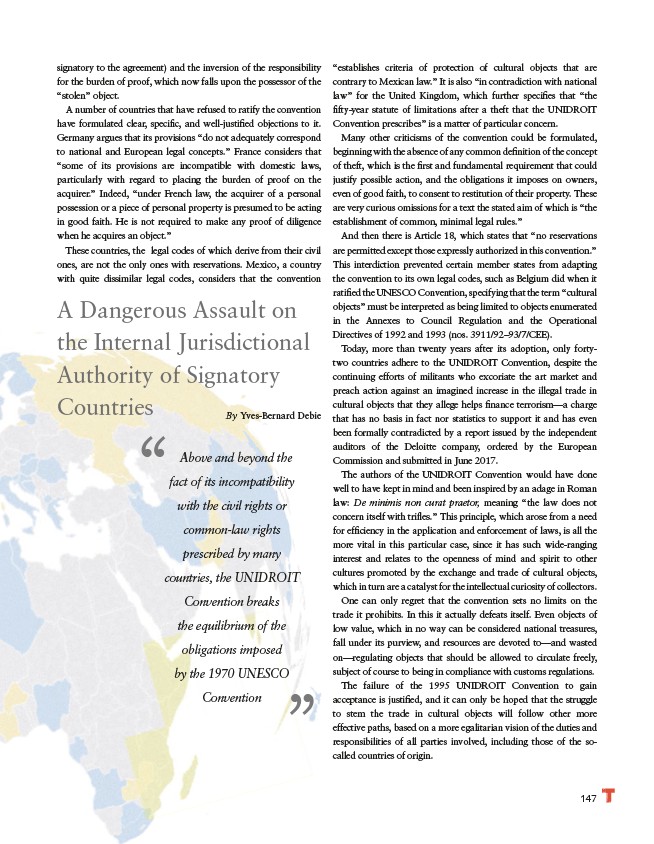
“establishes criteria of protection of cultural objects that are
contrary to Mexican law.” It is also “in contradiction with national
law” for the United Kingdom, which further specifi es that “the
fi fty-year statute of limitations after a theft that the UNIDROIT
Convention prescribes” is a matter of particular concern.
Many other criticisms of the convention could be formulated,
beginning with the absence of any common defi nition of the concept
of theft, which is the fi rst and fundamental requirement that could
justify possible action, and the obligations it imposes on owners,
even of good faith, to consent to restitution of their property. These
are very curious omissions for a text the stated aim of which is “the
establishment of common, minimal legal rules.”
And then there is Article 18, which states that “no reservations
are permitted except those expressly authorized in this convention.”
This interdiction prevented certain member states from adapting
the convention to its own legal codes, such as Belgium did when it
ratifi ed the UNESCO Convention, specifying that the term “cultural
objects” must be interpreted as being limited to objects enumerated
in the Annexes to Council Regulation and the Operational
Directives of 1992 and 1993 (nos. 3911/92–93/7/CEE).
Today, more than twenty years after its adoption, only fortytwo
countries adhere to the UNIDROIT Convention, despite the
continuing efforts of militants who excoriate the art market and
preach action against an imagined increase in the illegal trade in
cultural objects that they allege helps fi nance terrorism—a charge
that has no basis in fact nor statistics to support it and has even
been formally contradicted by a report issued by the independent
auditors of the Deloitte company, ordered by the European
Commission and submitted in June 2017.
The authors of the UNIDROIT Convention would have done
well to have kept in mind and been inspired by an adage in Roman
law: De minimis non curat praetor, meaning “the law does not
concern itself with trifl es.” This principle, which arose from a need
for effi ciency in the application and enforcement of laws, is all the
more vital in this particular case, since it has such wide-ranging
interest and relates to the openness of mind and spirit to other
cultures promoted by the exchange and trade of cultural objects,
which in turn are a catalyst for the intellectual curiosity of collectors.
One can only regret that the convention sets no limits on the
trade it prohibits. In this it actually defeats itself. Even objects of
low value, which in no way can be considered national treasures,
fall under its purview, and resources are devoted to—and wasted
on—regulating objects that should be allowed to circulate freely,
subject of course to being in compliance with customs regulations.
The failure of the 1995 UNIDROIT Convention to gain
acceptance is justifi ed, and it can only be hoped that the struggle
to stem the trade in cultural objects will follow other more
effective paths, based on a more egalitarian vision of the duties and
responsibilities of all parties involved, including those of the socalled
147
countries of origin.
signatory to the agreement) and the inversion of the responsibility
for the burden of proof, which now falls upon the possessor of the
“stolen” object.
A number of countries that have refused to ratify the convention
have formulated clear, specifi c, and well-justifi ed objections to it.
Germany argues that its provisions “do not adequately correspond
to national and European legal concepts.” France considers that
“some of its provisions are incompatible with domestic laws,
particularly with regard to placing the burden of proof on the
acquirer.” Indeed, “under French law, the acquirer of a personal
possession or a piece of personal property is presumed to be acting
in good faith. He is not required to make any proof of diligence
when he acquires an object.”
These countries, the legal codes of which derive from their civil
ones, are not the only ones with reservations. Mexico, a country
with quite dissimilar legal codes, considers that the convention
A Dangerous Assault on
the Internal Jurisdictional
Authority of Signatory
Countries
By Yves-Bernard Debie
Above and beyond the
fact of its incompatibility
with the civil rights or
common-law rights
prescribed by many
countries, the UNIDROIT
Convention breaks
the equilibrium of the
obligations imposed
by the 1970 UNESCO
Convention
“
“